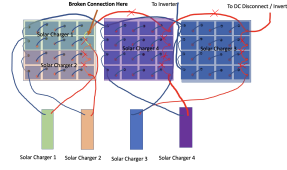OzSolar
Whatever you did, that's what you planned.
No part of my suggestion was to test capacity. It's a pass/fail test.That may only be accurate with starting batteries. I don’t know - just that resistance load testers seem to show low capacity for deep cycles vs starting batteries which have thin plates to make 600A cranking demand on starting a car.
I disagree. Just because it hasn't already had a melt down doesn't mean it's not about to.So if Solar lead acid batteries can survive Vermont winters I’m totally not going to red tag OP’s system that’s working still.
Here's some reasons I would red tag the entire system immediately.
-a battery cable corroded in two with one end just flapping around in the wind waiting for something with feathers to bump it into another battery terminal
-several more severely corroded battery connections about to fall apart
-no battery box so countless exposed connections waiting for some unsuspecting person or thing to get something conductive across them
-no class t fuses on the inverter homeruns so there's several hundred(?) feet of wire with no overcurrent protection
-no means of over current protection the PV positive wires directly fed to the batteries so there's another several hundred feet of wire with no overcurrent protection.
I'll stop there.



